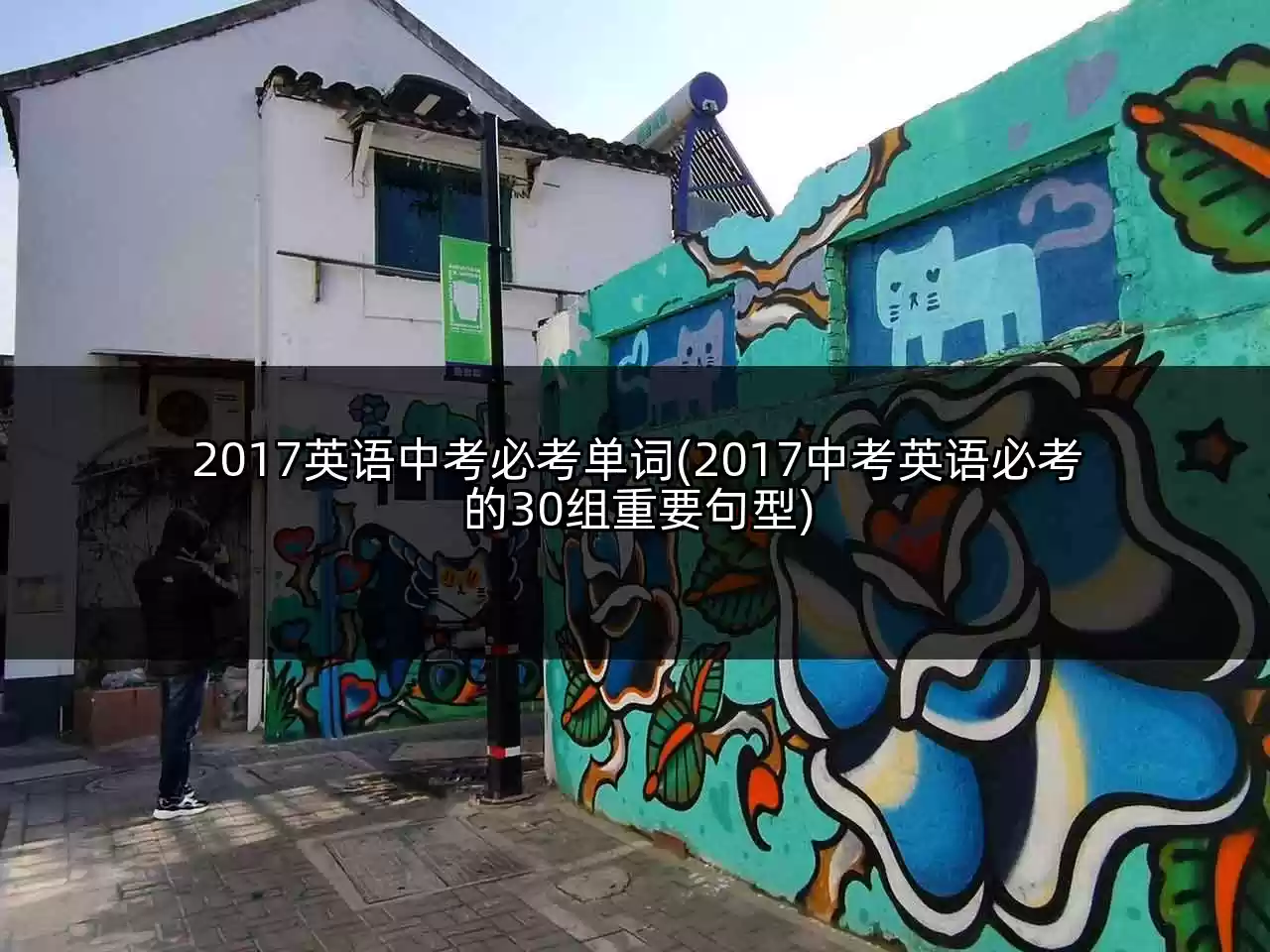微信扫码分享
2017英语中考必考单词(2017中考英语必考的30组重要句型)

这篇文章给大家聊聊关于2017英语中考必考单词,以及2017中考英语必考的30组重要句型对应的知识点,希望对各位有所帮助,不要忘了收藏本站哦。
本文目录
2017中考英语知识点总结:数词
数词是中考必考的一个语法点,基数词,序数词,分数
一、数词的分类数词主要分为基数词和序数词两类。
1.基数词表示数目的词称为基数词。其形式如下:
A.从1——10:one,two,three,four,five,six,seven,eight,nine,ten.
B.从11-19:eleven,twelve,thirteen,fourteen,fifteen,sixteen,seventeen,eighteen,nineteen.
这里除eleven,twelve,thirteen,fifteen,eighteen为特殊形式外,fourteen,sixteen,seventeen,nineteen都是由其个位数形式后添加后缀-teen构成。
C.从21——99:整数几十中除twenty,thirty,forty,fifty,eighty为特殊形式外,sixty,seventy,ninety都是其个位数形式后添加后缀-ty构成。表示几十几时,在几十和个位基数词形式之间添加连字符“-”
①21twenty-one②76seventy-six
D.百位数:1-9基数词形式加“hundred”,表示几百,在几十几与百位间加上and.
101ahundredandone320threehundredandtwenty648sixhundredandforty-eight
E.千位数以上:从数字的右端向左端数起,每三位数加一个逗号“,”。从右开始,第一个“,”前的数字后添加thousand,第二个“,”前面的数字后添加million,第三个“,”前的数字后添加billion。然后一节一节分别表示,两个逗号之间的数为百位数形式。①2,648twothousandsixhundredandforty-eight。②16,250,064sixteenmilliontwohundredandfiftythousandsixty-four。③5,237,166,234fivebillion,twohundredandthirty-sevenmillion,onehundredandsixty-sixthousand,twohundredandthirty-four
F.基数词在表示确切的数字时,要用百、千、百万、十亿的单数形式;但是,当基数词表示不确切数字,如成百、成千上万,三三两两时,则以复数形式出现。
fourhundredboysTherearehundredsofpeopleinthehall.
Theywenttothetheatreintwosandthrees.
注:several+hundred/thousand/million/billion+复数名词eg:Thereareseveralhundredstudents.
G.表示人的不确切岁数或年代,用几十的复数形式表示。更多资料QQ378459309制作:
1)表年龄:inone’s+整十的复数,表示在某人几十岁时
①Hebecameaprofessorinhisthirties.他三十多岁时成为了教授②在他四十岁时:___
2)表示年代:inthe+年份的复数,在几世纪几十年代.Itwasinthe1960s.那是在二十世纪六十年代。
H.基数词的句法功能
基数词在句中可作主语、宾语、定语、表语、同位语。
Thetwohappilyopenedthebox.(作主语)Ineedthreealtogether.(作宾语)
Fourstudentsareplayingvolleyballoutside.(作定语)Wearesixteen.(作表语)
Theythreetriedtofinishthetaskbeforesunset.(作同位语)
2.序数词:表示顺序的词称为序数词。序数词的主要形式:
A.从第一至第十九:其中,one—first,two—second,three—third,five—fifth,eight—eighth,nine—ninth,twelve—twelfth为特殊形式,其它的序数词都是由其相对应的基数词后面添加“th”构成。例如:six—sixth、nineteen—nineteenth.
B.从第二十至第九十九:
整数第几十的形式由其对应的基数词改变结尾字母y为i,再加“eth”构成。
twenty——twentieththirty——thirtieth第四十第五十
表示第几十几时,用几十的基数词形式加上连字符“-”和个位序数词形式一起表示。
thirty-first第三十一fifty-sixth第五十六seventy-third第七十三ninety-ninth第九十九
C.第一百以上的多位序数词:由基数词的形式变结尾部分为序数词形式来表示。
onehundredandtwenty-first第一百二十一;onethousand,threehundredandtwentieth第一千三百二十
D.序数词可以用缩写形式来表示。主要缩写形式有。
first——lstsecond——2ndthird——3rdfourth——4th
sixth——6thtwentieth——20thtwenty-third——23rd
注:lst,2nd,3rd为特殊形式,其它的都是阿拉伯数字后加上th。
E.序数词的句法功能:序数词在句中可作主语、宾语、定语和表语。
ThesecondiswhatIreallyneed.(作主语)Hechoosethesecond.(作宾语)
Wearetocarryoutthefirstplan.(作定语)Sheisthesecondinourclass.(作表语)
序数词前常要加定冠词the;但若序数词前出现不定冠词a或an时,则表示“再一”“又一”。
We’vetrieditthreetimes.Mustwetryitafourthtime?我们已经试过三遍了还必须试一次(第四次)吗?
▲表编号结构:名词(首字母要大写)+基数词=the+序数词+名词
LessonOne=thefirstlessonthefifthpage=Page5(five)thetwenty-firstroom=Room21(twenty-one)
二、时刻表示法
1.表示几点钟用基数词可以加o`clock,也可省略:5:00读作fiveo`clock或five
2.表示几点过几分,在分钟后加past,再加小时
eg:fivepastseven七点过五分halfpastsix六点半aquarterpasteight八点过一刻
3.表示几点差几分,在分钟后面加to,再加小时
tentoeight差十分八点(七点五十分)aquartertotwelve差一刻十二点(十一点四十五分)
差二十分六点
4.在日常生活中,以小时、分种为单位分别读出数字:
读作tentwenty-six14:03读作fourteenothree18:30读作eighteenthirty23:55读作
注:时刻表上的时间大多采用24小时表示法,这样就不需要用a.m.表上午,p.m.表下午了。
三、年月表示法
1.世纪=定冠词+序数词+century表示,也可以用定冠词+百位进数+`s表示
thesixth/6thcentury=the500’s公元六世纪the1900`s二十世纪the1600`s十七世纪
2.年代用定冠词+基数词+十位整数的所有格或复数形式构成
inthe1930`s/inthe1930s(inthethirtiesofthetwentiethcentury或inthenineteenthirties)
在二十世纪三十年代;在十九世纪六十年代
3.表示某年代的早期、中期和晚期,可以在定冠词后,年代前添加early,mid-,late
intheearly1920`s在二十世纪二十年代早期inthemid-1950`s在二十世纪五十年代中期
4.年月日表示法
A.年份用基数词表示,一般为阿拉伯数字:
1949读作nineteenhundredandforty-nine或nineteenforty-nine
1800读作eighteenhundred1902读作nineteenhundredandtwo或nineteenotwo
表示在哪一年,一般在年数前加介词in,eg:in2012在2012年
使用year时,year放在数词之前intheyeartwohundredfifty-threeB.C.在公元前253年
B.月份,在哪个月,用介词in加第一个字母大写的月份词:例如:inMay在五月;
月份常用缩写形式表示:缩写形式除May,June,July外,其它的月份都由其前三个字母表示,但September除外。January—Jan.February—Feb.March—Mar.April—Apr.
August—Aug.September—Sept.October—Oct.November—Nov.December—Dec.
注:这里缩写形式后面加点不能省略
C.日期在具体哪一天要添加介词on。更多资料QQ378459309制作:
NationalDayisonOct.1.(Octoberfirst也可以表示为NationalDayisonthe1stofOctober.)
May5(th)五月五日(读作Mayfifth)也可以表示为thefifth(5th)ofMay
Mar.1(st)(读作Marchfirst或thefirstofMarch)
注:通常情况下morning,afternoon,evening等词前用介词in。但是,当这些词前后有一修饰限定的词作为定语,把它们限定为某一天早晨、下午或晚上时,介词应改为on。这里的修饰限定词可以是介词短语、名词、形容词、定语从句等。Onacoldmorning,theoldmandiedlonelyinhishouse.
TheaccidenthappenedontheafternoonofJuly7./WearetohaveasmalltestonMondaymorning.
四、分数表示法.
1).结构:a).分子用基数词,分母用序数词.b).当分子大于1时,分母加复数.
3/4threefourths或threequarters1/3onethird或athird
1/2ahalf=onesecond11/2oneandahalf
2).注意:
a).当分数后面接可数名词时,如果分数表示的值大于1,名词用复数;<1,名词用单数。
11/2hours一个半小时(读作oneandahalfhours)4/5meter五分之四米
23/4meters二又四分之三米(读作twoandthree-fourthsmeters)
b).分数词作主语时,谓语动词根据分数词后面的名词来确定.
Twofifthsofthemilk______(be)drunkbyTom.Onethirdofthestudents_______(be)girls.
五、小数表示法
1.小数用基数词来表示,小数点读作point,o读作zero或o[ou],整数部分为零时,可以省略不读。
0.4zeropointfour或pointfour零点四10.23tenpointtwothree十点二三
25.67twenty-fivepointsixseven二十五点六七l.03onepointothree一点零三
2.当数字值大于1时,小数后面的名词用复数,数字值小于1时,小数后面的名词用单数。
1.03meters一点零三米0.49ton零点四九吨l.5tons一点五吨
六、百分数表示法:百分数=基数+percent表示这里的percent不用复数形式。
50%fiftypercent3%threepercent0.12%zeropointonetwopercent
七、数量表示法
1.表示长、宽、高、面积等:用基数词+单位词(meter,foot,inch,kilogram等)+形容词(long,wide,high等)表示,或者用基数词+单位词+in+名词(length,width,height,weight等)表示。
twometerslong或twometersinlength2米长threefeethigh或threefeetinheight3英尺高
2.表示温度时,用belowzero表示零下温度,温度=基数词+degree(s)+单位词(centigrade摄氏)表示。thirty-sixdegreescentigrade或36℃fourdegreesbelowzerocentigrade或-4℃摄氏零下4度
这里的单位词在人们都很清楚是什么度量制度时,可以省略。It’ssevendegreesbelowzero.今天是零下七度。(摄氏)
3.表示时间、距离时,使用含数词的名词所有格形式作定语。
fiveminutes`walk步行五分钟(的距离)onekilometer’sdistance一公里远。
4.数词加名词单数构成的短语,短语中间要用连字符“-”来连接,作定语修饰名词
It’safive-minutewalkfromthelibrarytotheplayground.She’sasixteen-year-oldgirl.
八、特殊用法
1.数词作主语,谓语动词用单数。如:Twomonthsisquitealongtime.
Fourandtwoissix.What’stwoandthree?
2.一个半小时(一年半,一个半月可类推)one/anhourandahalf=oneandahalfhours
2017中考英语必考的30组重要句型
1.It’stimetogohome.
是回家的时候了。
It’stimeforschool.
是上学的时候了。
2.It’sbad(manners)foryoutospitontheground.
随地吐痰不好。
Smokingisbadforyourhealth.
抽烟不利于你的健康。
Towalkisgoodforyourhealth.
散步有利健康。
3.Ittookmehalfanhourtofallasleeplastnight.
昨天夜里我花了半个小时才进睡。
Itcosthim¥1000tobuytheairticketfromLhasatoHohhot.
从拉萨到呼和浩特的飞机票花了他一千元。
4.You’dbetterputawayallyourclothes.
你把你的衣服收好。
You’dbetternotgountilyourauntarrives.
你等你的姨妈到了当了再走。
5.Iwonderwhat’swrong/thematter/thetroublewiththeanimal?
我想这动物得了什么病?
IwonderifyoucantellmewhichisthewaytothePalaceMuseum.
请问你是否能告诉我往故宫怎么走。
6.Beforetheoperationheusedtohaveaheadache.
在手术之前,他常常头痛。
IusedtogohikingwhenIwasyoung.
我年青时常常外出徒步旅行。
7.Theshelvesareusedforstoringbooks.
这些书架是用来放书的。
Theknivesareusedtocutthings.
这些小刀是用来切东西的。
8.I’dliketogothereonfoot/bybus.
我想步行/坐公共汽车到那儿往。
Wouldyoulikehimtomakeaphonecalltoyou?
你想他打电话给你么?
9.Ican’twaittopackmybag.
我迫不及待开我的包。
10.Let’shurrysothatwecangettherebeforesupper.
让咱们快点,以便在晚饭前赶到那里。
11.Myfatherlivessofarawaythatwehardlyseehim.
我父亲住在很远的处所,所以咱们难得见到他。
Hewalkedsuchalongwaythathefeltprettytired.
他走了这么远路,所以感到相当疲惫。
12.Theharderyouwork,thehighermarksyou’llget.
你学习越努力,你的成绩就越好。
Themorewegettogether,thehappierwewillbe.
咱们相聚越多就会越快乐。
13.Don’tbelatefortheconcert.=Don’tcomelatetotheconcert.
往听音乐会可别迟到了。
14.It’ssaidthathegetsonwellwithothers.
据说他跟别人相处的很好。
15.Heenjoysreadinginbed.
他喜欢躺在床上看书。
16.Shekeptonworkingalthoughshewastired.
虽然她很累,但仍然持续工作。
17.Theyarebusygettingreadyfortheparty.
他们正忙着为聚会作筹备。
18.Heoftentellsmenottoplayajokeontheoldpeople.他常常告戒我不要跟老年人开玩笑。
19.Isawthemanpullagunoutofhispocket.
我看见那人从口袋里取出了一把枪。
20.Iheardsomeoneshout“Fire!”andthenIheardpeoplerunningandshouting.
我听到有人高喊“着火啦!”,接着我又听到人们在边跑边喊。
21.Theymadeusplayfootballintherain.
他们让我们冒雨踢足球。
Themedicinewillmakeyoubetter.
这药会使你好转。
Theymadeitclearthattheydidn’tagreewithyou.
他们明白表示不同意你的看法。
Theyimprovedthesoftwaretomakeiteasierforpeopletousethecomputers.
他们改良了软件使人们更轻易地利用电脑。
22.Thegirlistooyoungtogetmarried.
这姑娘还太年幼,还不能结婚。
Hewastootiredtowalkanyfarther/further.
他太累了不能再走l。
23.HeisnotonlytheprideofthepeopleinHainan,butalsotheprideofpeopleallovertheworld.
他不仅是海南人的骄傲也是全世界人的骄傲。
24.Hepreferstravelingbytraintosittinginabus.
比起坐公共汽车来,他更喜欢坐火车旅行。
25.Bothheandhisfatherdomorningexerciseseveryday.他跟他父亲每天都做早操。
26.NeithershenorIfailedthehistoryexam.
她跟我历史测验都不及格。
NeitherInormymothercooksdinneronSundays.
礼拜天妈妈和我都不做饭。
NeitherofthemhasbeentoParis.
他们两个都没住过巴黎。
27.HewillcomebackeitherthisSundayorSaturday.
他将于周日或周六回来。
Theuneducatedpeoplewaseitherunabletodoitordoitbadly.
未受教导的人要么不能做要么做得很差。
Eitherbookischeap.=Eitherofthetwobooksischeap.
这两本书任何一本都是便宜的。
28.I’mafraidofflying/dogs.
我害怕乘坐飞机/怕狗。
Theoldmanwasafraidtocrossthebridgebecausehewasafraidoffallingintotheriver.
这位老人不敢过河,因为他怕掉到河里。
29.Idon’tthinkthemeetingroomcanholdtwohundredpeople.
我想这间会议室包容不下二百人。
Hedidn’tbelievehehadfailed(in)theexamination.
他不相信他考试没有及格
Isupposehemaybe/comefromEurope.
我猜想他可能来自欧洲.
30.Shespentalotofmoneyonclothes.=Shespentalotofmoney(in)buyingclothes.
她花很多钱买衣服。
Shespentalotoftime(in)surfing.
她花很多时光玩冲浪。
2017年中考英语常考知识点
中考的重要性不言而喻。要想在中考中决胜,在复习过程中抓住核心考点是关键要素之一。下面我给你分享2017年中考英语常考知识点,欢迎阅读。
2017年中考英语常考词性变换规则知识点一、可数名词单数变复数类
1.规则变化:
(1)一般情况加-s,如:girls,books,pens,bags,boys,days等。
(2)以s,x,ch,sh结尾加-es,如:buses,boxes,watches,brushes
(3)以o结尾的名词,无生命的名词多加-s,有生命的名词多加-es。
(4)以辅音字母加y结尾的名词,变y为i加-es,如:city→cities,story→stories
(5)以f或fe结尾的名词变f或fe为v加-es。如:leaf→leaves,knife→knives,shelf→shelves,wife→wives等。
2.不规则变化的名词要熟记:
man→men,woman→women,child→children,
foot→feet,tooth→teeth,mouse→mice,people→people,
sheep→sheep,Chinese→Chinese,Japanese→Japanese,deer→deer
二、动词/名词变形容词类
1.在动词后加后缀-ful
如:care→careful,use→useful;
thank→thankful,help→helpful;
wonder→wonderful,forget→forgetful
2.在名词后加-y
如:luck→lucky,cloud→cloudy;
wind→windy,rain→rainy;
sun→sunny,snow→snowy
noise-noisy,health→healthy
3.在名词后加-ly
如:friend→friendly,love→lovely,day→daily
4.方位名词加-ern
如:east→eastern,west→western
south→southern,north→northern
三、形容词加后缀变成名词
1.形容词加-ty变成名词
如:safe→safety,difficult→difficulty
2.形容词加-th变成名词
如:true→truth,warm→warmth,young→youth
四、形容词变副词类
形容词修饰名词、代词等作定语或表语;副词修饰动词、形容词或副词作状语。
1.一般形容词词尾加-ly变成副词,
如:slow→slowly,clear→clearly
quick→quickly,quiet→quietly
careful→carefully,sudden→suddenly
real→really,polite→politely
safe→safely,wide→widely
2.以“辅音字母+y”结尾的,要变y为i加-ly
如:easy→easily,happy→happily
heavy→heavily,lucky→luckily
busy→busily,angry→angrily;
3.以元音字母+e结尾,去e加-ly
如:true→truly
4.以辅音字母加-le结尾,去e加-y
如:terrible→terriblypossible→possibly
5.形容词与副词同形
如:fast→fast,early→early,high→high,hard→hard
6.注意:hard作形容词时意思是“困难的;硬的;生硬的”等;作副词时意思是“努力地”。hardly是否定副词,意思是“几乎不”。
五、动词变名词类
1.动词加-er变成名词
如:work→workerfarm→farmerteach→teacher
sing→singerspeak→speakerplay→player
read→readerdrive→driverwrite→writer
ride→riderdance→dancerrun→runner
win→winnercook→cookertravel→traveler
2.动词加-or变成名词
如:visit→visitor,invent→inventor,conduct→conductor,act→actor
六、基数词变序数词类:
主要掌握好1---12和20、30、40、50、60、70、80、90及21、22、23这几个序数词的形式:
one→firsttwenty→twentieth
two→secondthirty→thirtieth
three→thirdforty→fortieth
four→fourthfifty→fiftieth
five→fifthsixty→sixtieth
six→sixthseventy→seventieth
seven→seventheighty→eightieth
eight→eighthninety→ninetieth
nine→ninth
ten→tenth
eleven→eleventh
twelve→twelfth
twenty-one→twenty-first
twenty-two→twenty-second
twenty-three→twenty-third
七、形容词与副词的原级、比较级和最高级类
1.形容词和副词的比较级、最高级构成
部分双音节词或以形容词加-ly变成的副词和多音节词,在其前加more,most变成比较级和最高级。
如:interesting→moreinteresting,→mostinteresting
beautiful→morebeautiful,→mostbeautiful
slowly→moreslowly,→mostslowly
quickly→morequickly,→mostquickly
不规则变化:
good→better→bestwell→better→best
many→more→mostmuch→more→most
little→less→least
far→farther/further→farthest/furthest
ill→worse→worst
bad/badly→worse→worst
old→older/elder→oldest/eldest
2.原级:as+adj./adv.+as…(肯定)
“和……一样……”,
notas/so+adj./adv.+as…(否定)
“和……不一样……”“……不如……”
八、常见的反义词:
1.动词
buy—selltake—bring
remember—forgetdie—live
love—haterise—fall
ask—answerstart—finish
miss—catchpull—push
go—comeend—borrow
2.形容词
little—muchshort—tall/long
free—busyfull—empty
few—manygood—bad
white—blackcareful—careless
dead—livingcheap—expensive
clean—dirtyeasy—difficult
wet—drysame—different
open—closedstrong—weak
light—heavy
2017中考英语必知的词语辨析(3)
5.spend,take,cost,payspend的宾语通常是时间?金钱?在主动语态中,句子的主语必须是人,而且后面不能用动词不定式做它的宾语?如:Shespentthewholeeveninginreading。她把整个晚上用来读书?take常常用来指“花费”时间,句子的主语通常是表示事物的词语?如:Howlongwillthisjobtakeyou?你做这项工作要花多长时间?cost指花费时间?金钱或力气等,只能用表示事物的词做主语,并且不能用于被动语态?如:Howmuchdoesthejacketcost?这件夹克多少钱?pay主要指主语(某人)买某物(或为某事)付多少钱(给某人)?如:Ipayformyroomsbymonth。我按月支付租金?6.among,betweenbetween的意思是“在……中间,在……之间”,一般指在两者之间?如:Thereisatablebetweentwowindows。在两扇窗户之间有一张桌子?between有时也表示在多于两个以上的事物之间,但那是指在每二者之间?如:therelationshipbetweendifferentprovincesandmuniciplities省市和省市之间的关系(这里是指每两个省市之间的相互关系?)among的意思是“在……中间?在……之中”,一般指在三个或三个以上的同类事物之中?如:Theteacherdistributedthemamongthestudents。老师把这些东西分给了学生?
2017年中考英语语法构词法讲解
英语单词的构成方法主要有:合成法、转化法,派生法。此外还有截短法、混杂法和首字母缩略法的中考英语语法总结。
1.合成法:把两个或两相以上独破的词合成一个新词。
(1)合成名词
名词/代词+名词:spaceship宇宙飞船blood-test验血she-wolf母狼classroom
名词+动词-ing形式:handwriting书法machine-building机器制造
名词+及物动词+er/or:pain-killer止痛药
形容词+名词:shorthand速记highway公路
及物动词+名词:breakfast早餐pickpocket扒手
动词-ing形式+名词:flying-fish飞鱼waiting-room候车室sleeping-pill安息药
副词+动词:outbreak暴发output输出downfall垮台input
动词+副词:turn-off断开get-together联欢会;座谈会
介词/副词+名词:afternoon午后
(2)合成形容词的中考英语语法总结
形容词/数词+名词+-ed:kind-hearted,cold-blooded冷血的one-eyed独眼的,three-legged名词+名词+-ed:potato-shaped马铃薯形状的
名词/代词+动词从前分词:hand-made,self-educated,radio-equipped,
名词/代词+形容:color-blind色盲的
形容词/数词+动词-ing形式:left-hand左撇子的
形容词+动词-ing形式:good-looking面孔丢脸的easy-going性情随和的
副词+动词-ing形式:hard-workingstudents勤恳的far-reaching深远的long-lasting耐用的
副词+形容词:ever-greentrees常青树
形容词+形容词:light-blue浅蓝色的
动词+副词:see-throughpool透明的
介词+名词:downhill下坡的uphill上山的
(3)合成动词
副词+动词:ill-treat危害undergo经历overhear(无意)听见overthrow*
名词/代词+动词:water-ski滑水mass-produce大范畴生产sleep-walk梦游
形容词+动词:blacklist列入黑名单white-wash粉刷safe-guard保卫
(4)中考英语语法总结合成副词
副词+副词:however然而moreover而且,therefore
代词+副词:anywhere任何地方whatever无论什么somewhere,nowhere,everywhere
副词+名词:downstairs在楼下upstairs,upward,downward,westward,eastward
形容词+名词:anyway无论如何
(5)合成代词some,any,no能够与-thing,-one,-body合成代词。如:
anybody任何人something某事everything所有nobody不人someone每个人
2.转换法:由一种词类转化为另一种词类的词。
(1)动词转化为名词。如:
Hevisitedthesummerpalaceyesterday.他昨天参观了颐跟园。(动词)
wepaidavisittothescientistlastweek.我们上星期访问问了那位科学家。(名词)
Helikesaquietsmokeaftersupper.他喜好在晚饭后静静地抽了一会儿烟。(名词)
westoppedthereforaswim.咱们在那儿停下来游了一会儿泳。
这类名词常与give,have,make,take等动词搭配形成一个短语,表示一个动作。如:
giveashout喊叫giveakick踢takeaseat就座takeabath洗澡haveaswim游泳
haveasmoke吸烟makeabet打赌makeadecision商定
又如:haveabath(chat,debate,discussion,dream,flight,interview,lie,look,quarrel,rest,ride,shave,smoke,talk,taste,try,walk,wash…)
makeacall(demand,guess,jump,show,anadvance,anattack,anattempt…)
(2)名词转化为动词。中考英语语法总结如:
Weshouldshouldertheseresponsibilities.咱们应当担负起这些任务来。
Thehallcanseattwothousandpeople.大厅能坐2000人。
Hepinnedgreathopesonus.他对我们寄托了很大渴望。
Theyhavebookedtheirplanetickets.他们已经定了飞机票。
(3)形容词转化为动词。如:
Thetrainsloweddowntohalfitsspeed./theroomgraduallyquieteddown.
(4)形容词转化为副词。如:
Howlongistheline?(形容词)howlonghaveyoulivedthere?(副词)
(5)形容词转化为名词。如:thesick(病人)thebeautiful(美好的事物)atthelatest(最迟)atthemost(至多)thetrueandthefalse(正确的与错误的)thefrench(法国人)
somethinghasgonewrongwiththemachine.机器出了点儿弊端。(形容词)
hedidn’tknowthedifferencebetweenrightandwrong.他不知道对与错的差异。(名词)
3.派生法:由词根(stems)加前缀(prefixes)和后缀(suffixes)构成新词。
①前缀
a-(形容词;副词):asleep,arise,awake,abroad(在国外),alone(独自)
co-(奇特):co-exist,co-operate
over-(过于):overdo,oversimplify
anti-(反,防):anti-tank,anti-clockwise
re-(重复;再):return,redesign,reunite,remarry(再婚)
super-(超级,上层):superstar,superman,supermarket
sub-(下面的):subway,subconscious
tele-(远程):telephone,telegraph,telescope(望远镜)
bi-(双):bicycle,bimonthly,bilingual
mis-(误):mistake,misunderstand(曲解)
inter-(彼此;之间):international,interrelation
en-(使可能):encourage,enable(使成为可能)
dis-(否定):disappear,disagree,discourage,disappoint,dishonest,
in-/il-/im-/ir-(不;非):invisible(看不见的),illogical,illegal(非法的),impolite,impossible,irregular,irresponsible
un-/non-(不;非):unfit,unfair,unknown,non-conductor(非导体)
②名词后缀
-er(……者):foreigner,thinker,swimmer,traveller
-ese(……处所的人):chinese,portuguese,japanese
-ian(粗通……的人;……地方的人):musician,magician,physician,technician,russian
-ist(专业人员):artist,specialist,pianist,physicist
-ment(性质;状态):government,movement,argument,engagement,development
-ion:expansion,discussion,decision
-dom:freedom,kingdom
-ance/ence:acceptance,allowance,dependence,confidence
-ee:employee,interviewee,trainee
-ness(性质;状况):business,happiness,greatness,illness,darkness
-or(器具;……者):cooker,tractor,actor,visitor,professor
-ship:friendship,leadership,hardship,scholarship
-tion(动作;过程;结果):pollution,suggestion,invention
③形容词后缀
-al:practical,continual,educational,national
-an:american,european,canadian,italian,australian
-ern:southern,northern,eastern
-ful:helpful,cheerful,grateful,useful,careful
-ary:revolutionary,secondary,imaginary
-ble:reasonable,horrible,comfortable,acceptable,terrible
-ish:foolish,childish,swedish,british,english
-ive:active,native,decisive,destructive,expensive
-y:rainy,dirty,sleepy,healthy
-less:careless,homeless,motherless,useless
-ant:important,significant,ignorant
-ous:serious,courageous,famous,continuous
-some:troublesome,tiresome,handsome,lonesome
④动词、副词和数词后缀
-fy(使……化):simplify,beautify,amplify,satisfy,electrify
-en(使……变得):strengthen,lengthen,widen
-ize(使……成为):realize(实现),modernize,apologize,organize
-ly(方式;程度):freely,badly,terribly,perfectly,truly,angrily
-wise:clockwise,otherwise,likewise
-ward(s)(方向):towards,backward,eastward,forward,outward
-teen(十):fourteen,fifteen,eighteen
-ty(整十位数):twenty,forty,thirty-th(序数词):twelfth,ninth,twentieth
4.截短法:将单词缩写,词义跟词性保持不变的英语构词法称为截短法,主要有截头、去尾、截头去尾等情势。
①截头telephone→phoneairplane→plane
②去尾mathematics→mathsexamination→examkilogram→kilolaboratory→labtaxicab→taxi
③截头去尾influenza→flurefrigerator→fridgeprescription→script
5.混合法:英语构词还可能将两个词混淆或各取一局部紧缩而成一个新词,前半部分表属性,后半部分表主体。这样的英语构词法就是混正当。
newsbroadcast→newscast新闻广播televisionbroadcast→telecast电视播送smokeandfog→smog烟雾photoandgraphy→photography摄影,摄影术helicopterairport→heliport直升飞机场
6.首字母缩略法的中考英语语法总结
BBC(britishbroadcastingcorporation)英国广播公司;DIY(doityourself)自己亲自做NATO(northatlantictreatyorganization)北约;SOS(saveourship)国际通用的呼救信号
UN(theunitednations)联合国;USA(theunitedstatesofAmerica)美国
VIP(veryimportantperson)重要人物;WTO(worldtradeorganization)世界贸易组织
好了,本文到此结束,如果可以帮助到大家,还望关注本站哦!
上一篇:中考语文必读书目(2021中考必考12本名著分别是什么)
下一篇:没有了

